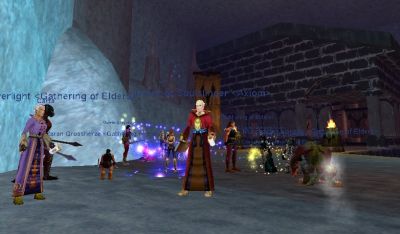After an exploratory return to the game, we mulled last time over how “abhorrent behaviors” in Everquest became acceptable, reasonable tactics for players. As silly as they were in the game, the players were still having fun, perhaps only at the cost of detracting from the immersion in game’s fiction. Of course Everquest’s world seemed to be pretty much a lump of 20 years of the creators’ favorite Dungeons and Dragons campaigns (Racial languages? Foraging skills?) so there wasn’t a whole lot of immersion to break.
 Of course that was okay! They were forging new territory… While Ultima Online was the first large-scale success in the online space, with Everquest it got even more widely-accepted… and new gamers were still enamored with this persistent multiplayer combat-and-socialization model and discovering what they enjoyed doing. If people found, say, staking their virtual claim on a small collection of huts, systematically killing every orc that appeared there to be effective (that is, spawn camping) perhaps there’s something to it. These gamers didn’t want to wander around and trust that a patrolling creature might not jump them at the wrong time, but rather find an area of a reasonably predictable challenge and socialize while they waited.
Of course that was okay! They were forging new territory… While Ultima Online was the first large-scale success in the online space, with Everquest it got even more widely-accepted… and new gamers were still enamored with this persistent multiplayer combat-and-socialization model and discovering what they enjoyed doing. If people found, say, staking their virtual claim on a small collection of huts, systematically killing every orc that appeared there to be effective (that is, spawn camping) perhaps there’s something to it. These gamers didn’t want to wander around and trust that a patrolling creature might not jump them at the wrong time, but rather find an area of a reasonably predictable challenge and socialize while they waited.
Subsequent games tried to change that habit. Dark Age of Camelot gave players an extra XP incentive to kill creatures that hadn’t been killed in a while, encouraging them to move between spawns rather than stick to a single one. Star Wars Galaxies had the interesting take of creating monster “hives” that continuously spawned its supply of mobs until it culminated with a boss fight, after which the hive was destroyed. A shame that the world wasn’t an interesting place to venture out in otherwise. :-/
But in both those cases they tried to change the core behavior of those gamers, which was to seek out a location of stability where they could grind in peace. In most cases MMO’s since Everquest has tried to create alternatives, but I’m not aware of any (with the possible exception of Galaxies above) that tried to create new gameplay around it.
I actually find that surprising because in many cases game developers are pretty good about taking an odd bit of unexpected gameplay and turning it into an asset. Take the practice of kiting, for instance, where a player uses a combination of damage and incapacitating powers to keep a powerful creature at a distance while they slowly whittle them down to their eventual death. In Everquest, this was seen as an abhorration that allowed players to kill things that were genuinely higher than their appropriate level. A series of nerfs ensued to try to rectify the situation, but the tactic (there’s that word again) entered the basic toolkit of the everyday MMO player.
These days, kiting is less often frowned upon and considered more of a valid tactic in games like LOTRO and City of Heroes, although maligned by some. It still bears the mark of being player-driven, however… there are occasions where players accomplish feats that the designers never even dreamed of, like these WOW players that awesomely kited a devastating boss into the main human city of Stormwind. My hat’s off to you, lads.
Anyway, games are full of unexpected surprises that delight gamers and even their creators. When id Software added knockback damage to rockets to Doom and Quake, they didn’t initially do so with the intent of creating the technique of rocket jumping (that is, to fire your own rocket at the ground to blast you high into the air). This only became apparently through play. However, once it happened, they didn’t shut it down. In subsequent games like Quake III they made it easier, and better balanced the risk-reward of liftoff versus damage taken. These days, Team Fortress 2 has turned these antics into practically a twisted, explosive ballet.
Consider also the “errors” that gave us attack canceling in Street Fighter II (brilliantly explained in this article by God of War’s Eric Williams) that led to the lengthy combos that are integral to tourament play over 15 years after the game’s creation. The ridiculous pistol juggling seen in Devil May Cry, where a “bug” caused a damaged creature to stop falling, was embraced by its creator and set itself as the hallmark move of the game. The entire game of Deus Ex relied on emergent gameplay (whose very definition implies unforseen uses of gameplay elements) to deliver the player an experience made unique by their solutions to problems placed before them.
Without these “accidents”, gaming might be a lot less interesting these days.

One thought on “EQ the Return Part 3: Legitimizing your “Mistakes””